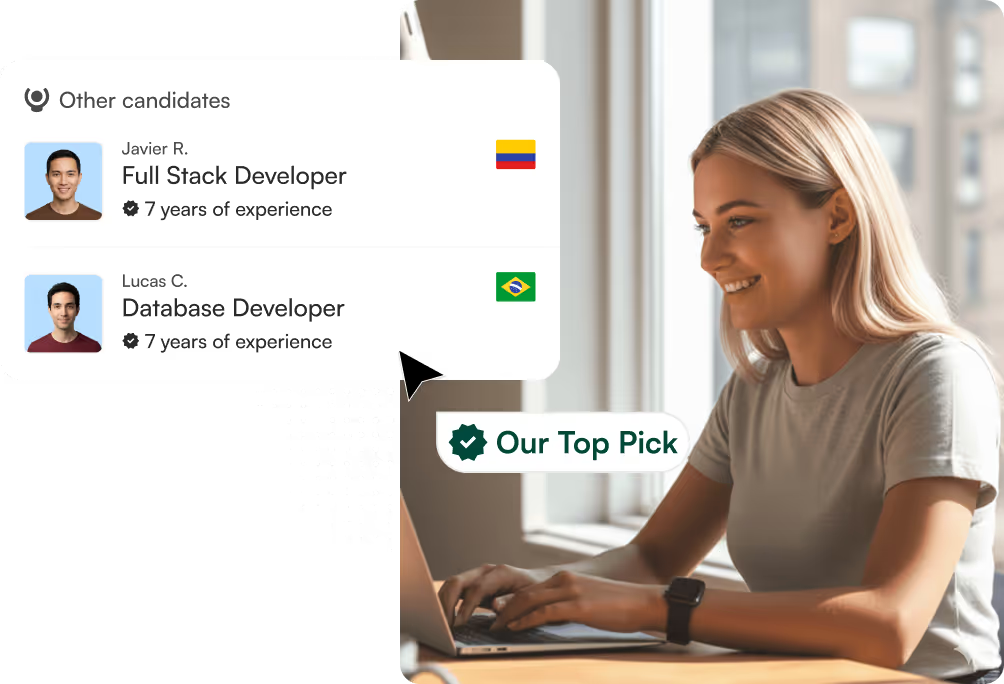AI Won't Take Your Job, But Humans Who Master AI Will Take Yours


Lupa will help you hire top talent in Latin America.
Book a Free Consultation
Lupa helps you build, manage, and pay your remote team. We deliver pre-vetted candidates within a week!
Book a Free ConsultationThe fear that artificial intelligence will steal our jobs is everywhere. But here's the truth: AI won't take your job—someone who knows how to use AI tools effectively will.
This isn't just another hot take about the future of work. It's the reality we're living through right now. While everyone's debating whether AI will replace humans, the smart money is on professionals who are already learning to work alongside these technologies, becoming exponentially more productive and valuable.
At Lupa, we've witnessed this transformation firsthand. The premium LatAm professionals we place aren't just technically skilled—they're the ones embracing AI as a strategic advantage. They understand that automation isn't the enemy; avoiding it is.
This is your wake-up call. The job market is splitting into two camps: those who adapt and thrive with AI, and those who don't. Which side will you choose?
The Real Story Behind AI and Employment
The headlines scream about mass layoffs and AI automation taking over everything. But the data tells a more nuanced story that should give you confidence rather than anxiety.
According to McKinsey research, approximately 30% of work activities across industries could be automated by 2030. However—and this is crucial—this doesn't mean 30% of jobs will disappear. Instead, roles will transform as AI handles repetitive tasks while humans focus on higher-value activities requiring creativity, emotional intelligence, and complex decision-making.
The World Economic Forum projects that while 85 million jobs may be displaced by automation by 2025, 97 million new jobs will emerge that are better adapted to human-AI collaboration. This isn't just optimistic thinking—it's the historical pattern of technological advancement creating more opportunities than it destroys.
Current AI capabilities excel at pattern recognition, data analysis, and processing vast amounts of information. But AI technology still struggles with tasks requiring cultural understanding, ethical judgment, creative problem-solving in unstructured environments, and the kind of nuanced communication that builds trust and drives business relationships.
This is exactly why the premium LatAm talent we work with at Lupa remains so valuable. They combine technical expertise with cultural fluency, emotional intelligence, and the adaptability to work seamlessly with AI tools—not against them.
Why Some Jobs Are Vulnerable (And What This Really Means)
Let's be direct: certain roles face higher automation risk, but it's not just about the work itself—it's about how people in those roles respond to AI capabilities. The professionals who will struggle aren't in "vulnerable" industries; they're the ones refusing to adapt.
Data Entry and Administrative Roles
Data entry specialists and administrative coordinators face the highest automation risk because these roles involve highly structured, repetitive tasks that AI-powered systems can execute with greater speed and accuracy. Automated systems can now extract information from documents, categorize data, and update databases without human intervention.
But here's what the doomsday predictions miss: the professionals thriving in these fields are those who've evolved beyond basic data processing. They've become data analysts, process optimizers, and strategic coordinators who use AI tools to handle routine tasks while they focus on insights and relationship management.
Customer Service Representatives
Basic customer service is increasingly handled by chatbots and AI-powered virtual assistants that can manage routine inquiries 24/7. Companies like Bank of America's Erica and various customer service automation platforms demonstrate how AI can handle standard customer interactions efficiently.
Yet the best customer service professionals aren't being replaced—they're being elevated. They're handling complex issues, building deeper customer relationships, and using AI tools to access information faster and personalize interactions in ways that drive real business value.
Entry-Level Financial and Administrative Analysts
Basic bookkeeping, routine financial analysis, and administrative coordination are increasingly automated through AI-powered software platforms. These tools can categorize transactions, generate reports, and even handle basic market research tasks that once required human analysts.
The opportunity here is clear: entry-level professionals who learn to work with these AI tools become exponentially more productive, handling larger portfolios and focusing on strategic analysis rather than data processing.
Manufacturing and Retail Operations
Robotics and automation have transformed manufacturing environments, while retail increasingly uses self-checkout systems and automated inventory management. These changes reduce demand for traditional assembly line workers and cashiers.
But successful professionals in these industries are evolving too—becoming robotics technicians, process managers, and customer experience specialists who understand both the technology and the human elements that drive business success.
The Career Paths That Will Thrive
The future belongs to professionals who combine human capabilities with AI tools. These aren't just "AI-proof" jobs—they're roles that become more valuable as AI capabilities expand.
Healthcare Professionals
Healthcare workers who integrate AI tools for diagnostics and patient management are becoming exponentially more effective. AI can analyze medical scans, predict patient outcomes, and streamline administrative tasks, but the core of healthcare—building patient trust, making complex ethical decisions, and providing compassionate care—remains distinctly human.
The most successful healthcare professionals are those using AI tools to enhance their diagnostic capabilities while focusing their human skills on patient relationships and complex medical decision-making.
Creative and Strategic Professionals
Creative professionals who learn to use generative AI tools for ideation, content creation, and design iteration are producing higher-quality work faster than ever before. Rather than replacing creativity, AI tools amplify human creative capabilities by handling routine creative tasks and enabling rapid prototyping of ideas.
At Lupa, we see this with the creative professionals we place: the most valuable designers, marketers, and content creators are those who use AI tools to enhance their creative process while bringing distinctly human insights about culture, emotion, and business strategy.
Technology and Engineering Roles
Software development, data science, and engineering roles are evolving rapidly as AI tools handle routine coding, testing, and analysis tasks. But the most successful professionals in these fields are those who understand how to direct AI tools, review their outputs, and focus on architecture, strategy, and complex problem-solving.
These professionals aren't being replaced by AI—they're becoming more productive and focusing on higher-level challenges that require human judgment and creativity.
Business Leaders and Relationship Managers
Leadership, sales, negotiation, and strategic business roles require emotional intelligence, cultural understanding, and the ability to build trust—capabilities that remain uniquely human. These professionals use AI tools for market research, data analysis, and administrative tasks while focusing their human skills on relationship building and strategic decision-making.
How to Future-Proof Your Career: A Strategic Approach
The key isn't just surviving the AI revolution—it's thriving in it. Here's how to position yourself as indispensable in an AI-driven job market:
Embrace AI as Your Strategic Advantage
Stop thinking of AI as competition and start viewing it as your most powerful productivity tool. Learn to use AI tools like ChatGPT, Copilot, or industry-specific AI platforms to handle routine tasks so you can focus on strategic, creative, and relationship-building activities.
The professionals we place through Lupa don't fear AI—they leverage it. They use AI tools for research, data analysis, content creation, and administrative tasks, freeing them to focus on the high-value work that drives business results.
Develop Complementary Skills
Focus on capabilities that enhance rather than compete with AI capabilities. This includes:
- Emotional intelligence for building relationships and understanding team dynamics
- Creative problem-solving for addressing unique challenges that don't fit standard patterns
- Cultural fluency for navigating diverse business environments and building trust across cultures
- Strategic thinking for making complex decisions that consider multiple variables and stakeholder needs
- Adaptability for learning new technologies and adjusting to changing business requirements
Position Yourself as an AI-Human Bridge
The most valuable professionals in the coming years will be those who can effectively integrate AI tools into business processes while maintaining the human touch that drives results. This means understanding both the capabilities and limitations of AI technology while knowing when human judgment and relationships are essential.
Continuous Learning and Skill Development
The pace of AI advancement means continuous learning isn't optional—it's essential for career survival. Stay current with AI tools in your industry, understand how they can enhance your productivity, and develop skills that complement rather than compete with automation.
This doesn't mean becoming a technical expert in machine learning or algorithms. It means understanding how to use AI tools effectively and knowing when human expertise is irreplaceable.
Getting Your Team AI-Ready: Leadership in the AI Era
If you're leading a team, your role in the AI transition is crucial. The organizations that thrive will be those whose leaders help their teams adapt rather than resist technological change.
Show, Don't Just Tell
Demonstrate the power of AI tools by using them yourself. Show your team how a task that traditionally takes an hour can be completed in minutes using AI assistance. When people see concrete examples of productivity gains, resistance turns into curiosity.
At Lupa, we regularly share discoveries about AI tools and applications across our team. We encourage knowledge sharing about new techniques and celebrate team members who find innovative ways to integrate AI into their workflows.
Create a Culture of Experimentation
Encourage your team to experiment with AI tools in low-risk situations. Provide training resources and time for exploration. The goal isn't to replace human judgment but to augment human capabilities.
Focus on Value Creation
Help your team understand that AI adoption isn't about working faster—it's about creating more value. When AI handles routine tasks, humans can focus on relationship building, creative problem-solving, and strategic initiatives that drive real business results.
The Lupa Perspective: Why This Matters for Global Talent
At Lupa, we're not just observing the AI transformation—we're actively helping our clients navigate it. The premium LatAm professionals we place understand that success in the modern job market requires both technical expertise and the ability to work effectively with AI tools.
This is particularly relevant for companies building global teams. The future belongs to organizations that can combine human creativity and cultural intelligence with AI capabilities. LatAm professionals offer a unique advantage in this environment: they bring both technical skills and the cultural fluency needed to build relationships and drive results in diverse business environments.
The professionals who command premium positions in this market aren't just technically competent—they're culturally intelligent, emotionally aware, and skilled at using AI tools to amplify their human capabilities.
The Bottom Line
Here's the uncomfortable truth: AI won't come to life and steal your job. But humans who master AI tools will outperform, out-produce, and ultimately replace those who don't adapt.
The choice is yours. You can view AI as a threat and resist change, or you can embrace these tools as strategic advantages that make you exponentially more valuable in the job market.
The smartest professionals are already making this choice. They're learning AI tools, developing complementary skills, and positioning themselves as bridges between technology and human value creation.
The future of work isn't about humans versus AI—it's about humans with AI versus humans without it. Which side will you be on?
Ready to Build an AI-Enhanced Team?
The future belongs to organizations that combine premium human talent with strategic AI adoption. At Lupa, we specialize in connecting companies with LatAm professionals who bring both technical expertise and the cultural intelligence needed to thrive in an AI-driven business environment.
These aren't just technically skilled professionals—they're strategic thinkers who understand how to leverage AI tools while maintaining the human relationships that drive real business results.
Ready to build a team that embraces the future rather than fears it? Let's discuss how our consultative approach can help you find professionals who will grow with your business rather than just fill immediate needs.
Book a discovery call to learn how we can help you navigate the AI transition with confidence.

"Over the course of 2024, we successfully hired 9 exceptional team members through Lupa, spanning mid-level to senior roles. The quality of talent has been outstanding, and we’ve been able to achieve payroll cost savings while bringing great professionals onto our team. We're very happy with the consultation and attention they've provided us."


“We needed to scale a new team quickly - with top talent. Lupa helped us build a great process, delivered great candidates quickly, and had impeccable service”


“With Lupa, we rebuilt our entire tech team in less than a month. We’re spending half as much on talent. Ten out of ten”






















